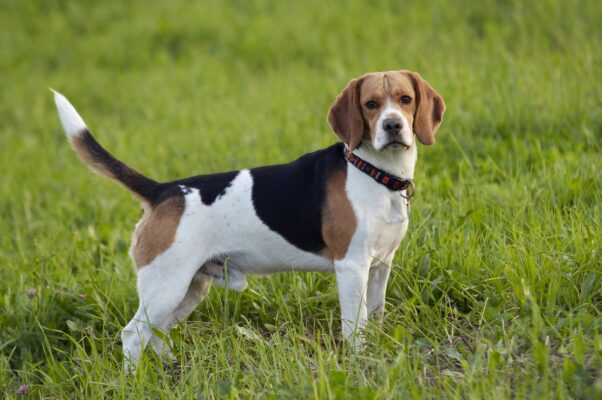Beagle – The Charming and Spirited Hound
Beagles are a popular breed known for their friendly nature, keen sense of smell, and energetic spirit. Widely recognized as excellent family companions and efficient hunting dogs, Beagles boast a rich history, distinct physical traits, and a lively personality that makes them a favorite among dog lovers. This comprehensive article covers the breed’s history, physical characteristics—including detailed measurements, weight, and lifespan—temperament, care tips, and common health considerations.

1. History and Origins
Originally bred for hunting, the Beagle’s lineage dates back to ancient times, with roots in hound breeds developed in England and later refined in the United States. Their exceptional sense of smell and tracking ability made them invaluable for detecting small game, especially rabbits. Over time, Beagles transitioned from working hounds to beloved family pets, thanks to their manageable size and amiable temperament.
Their rich history is evident in their strong hunting instincts and the perseverance they display during tracking. Despite their origins as working dogs, modern Beagles have become a staple in households due to their adaptability, intelligence, and lovable character.
2. Physical Characteristics, Size, and Lifespan
Beagles are compact yet robust dogs, characterized by a sturdy body built for endurance and agility. Their physical attributes not only enhance their performance as scent hounds but also make them appealing as family companions.
Key Physical Features:
- Head and Face: Beagles have a well-proportioned head with large, expressive eyes and floppy ears that frame their friendly face. Their alert expression reflects their lively and curious nature.
- Coat: They possess a short, dense coat that is easy to maintain. Beagles come in various color combinations, often featuring tricolor or bicolor patterns that add to their distinctive look.
- Build: With a compact, muscular body, Beagles are designed for agility and stamina. Their balanced physique allows them to navigate diverse terrains, a trait inherited from their hunting ancestors.
Detailed Measurements:
- Height: Beagles typically stand between 13 to 16 inches (33 to 41 cm) at the shoulder.
- Weight: They generally weigh between 20 to 25 pounds (9 to 11 kg), making them a manageable size for families and urban living.
- Life Expectancy: With proper care, Beagles have a life expectancy of approximately 12 to 15 years. Their longevity depends on genetics, diet, exercise, and regular veterinary check-ups.
These physical details contribute to the Beagle’s enduring popularity, as they combine practicality with an appealing, friendly appearance.
3. Personality and Temperament
Beagles are celebrated for their cheerful and outgoing demeanor. Their personality is a blend of intelligence, independence, and affection, making them ideal companions in various settings.
- Friendly and Sociable: Beagles are naturally friendly, thriving on social interactions with both people and other dogs. Their sociable nature makes them excellent family pets and ideal candidates for multi-pet households.
- Energetic and Playful: Known for their high energy levels, Beagles require regular exercise and mental stimulation. They enjoy interactive play, long walks, and engaging activities that allow them to use their keen noses.
- Intelligent and Inquisitive: Their strong sense of curiosity can sometimes lead to distractions, as Beagles are easily captivated by scents. This trait underscores their history as scent hounds and means they require consistent training and supervision.
- Stubborn yet Affectionate: While Beagles can exhibit a stubborn streak, they are also deeply affectionate. Patience and positive reinforcement in training are essential to channel their independent spirit productively.
Their balanced temperament allows them to be both spirited adventurers and loving family members, adapting well to various lifestyles.
4. Care and Training
4.1. Nutrition and Feeding
Proper nutrition is vital to maintaining a Beagle’s health and energy:
- High-Quality Diet: Choose premium dog food that provides the right balance of proteins, fats, and essential nutrients. Beagles, being energetic, benefit from a diet that supports sustained energy levels.
- Portion Control: Due to their predisposition to weight gain, it is important to monitor their food intake carefully. Feeding measured portions at regular intervals can help prevent obesity.
- Regular Feeding Schedule: Maintaining a consistent feeding routine supports healthy digestion and overall well-being.
4.2. Exercise and Activity
Beagles thrive on physical and mental exercise:
- Daily Walks: Aim for at least 30 to 60 minutes of daily exercise, which can be split between walks, playtime, and interactive games.
- Mental Stimulation: Given their sharp sense of smell, activities like scent-based games or puzzle toys can keep their minds engaged.
- Safe Off-Leash Time: In secure, fenced areas, off-leash play can allow them to explore and satisfy their tracking instincts. However, be mindful of their tendency to follow scents, which could lead them away from home if unsupervised.
4.3. Training and Socialization
Training and socialization are key to managing the Beagle’s inquisitive nature:
- Positive Reinforcement: Use rewards such as treats, praise, and play to encourage obedience. Consistent, gentle training helps overcome their occasional stubbornness.
- Early Socialization: Introducing Beagles to various environments, people, and other pets early in life ensures they grow up to be well-rounded and confident.
- Recall Training: Given their independent streak and strong sense of smell, it is essential to work on reliable recall so they can be safely managed during outdoor activities.
5. Health Considerations
Beagles are generally healthy but may be predisposed to certain conditions. Preventive care and regular veterinary visits are essential:
- Obesity: Due to their love for food and ease of weight gain, it’s important to monitor their diet and ensure they get sufficient exercise.
- Ear Infections: Their long, floppy ears can trap moisture and debris, making them prone to infections. Regular ear cleaning and proper grooming can help prevent such issues.
- Hip Dysplasia: Although less common in Beagles, hip dysplasia can occur. Maintaining a healthy weight and providing joint-friendly supplements can mitigate the risk.
- Hypothyroidism: Some Beagles may develop thyroid issues, which can affect their energy levels and metabolism. Routine health screenings help in early detection and management.
A proactive approach to health care, including proper diet, exercise, and regular vet visits, is key to ensuring your Beagle lives a long, healthy, and happy life.
6. The Role of the Beagle in Society
Beyond being a charming companion, the Beagle’s historical role as a hunting dog has influenced its reputation:
- Hunting and Tracking: Their extraordinary sense of smell and persistence make them excellent scent hounds, historically used for hunting small game.
- Family Pets: Today, Beagles are beloved for their adaptable and friendly nature, making them ideal for families, singles, and seniors alike.
- Therapy and Companionship: Their affectionate temperament and moderate size allow them to excel as therapy dogs, offering comfort in various care settings.
The Beagle’s versatility and engaging personality continue to endear them to households around the world, whether in a working capacity or as a cherished pet.
7. Conclusion
The Beagle is a breed that perfectly balances spirited energy with a loving, friendly nature. With its well-documented history as a skilled scent hound and its transition into a beloved family pet, the Beagle offers a unique blend of characteristics that make it both practical and delightful. Detailed measurements—including a height of 13 to 16 inches, a weight of 20 to 25 pounds, and a life expectancy of 12 to 15 years—highlight their suitability for a variety of living environments.
For those seeking an active, inquisitive, and affectionate companion, the Beagle is an excellent choice. With proper nutrition, regular exercise, consistent training, and proactive health care, a Beagle can bring endless joy, loyalty, and vitality to your home.


